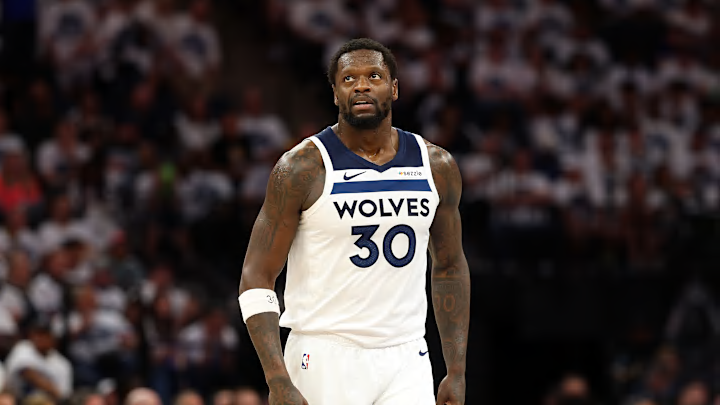The first season of the Julius Randle experience for the Minnesota Timberwolves had its highs and lows. Of course, the Wolves ultimately made a conference finals run, and Randle performed at an elite level in the first two rounds of the playoffs. However, Randle also performed poorly in the conference finals, averaging more turnovers (3.6) than assists (3) while decreasing his points per game average in the first two rounds from 23.9 to 17.4.
Randle has struggled with consistency throughout his career. For a Wolves team with title aspirations, Randle providing consistent second option production will be key to Minnesota's success. The Wolves know they can count on Anthony Edwards, but they'll need Randle to be consistent throughout the season to maximize their title chances.
Consistency as a scorer and playmaker will be vital for Randle
Randle mainly provides scoring and secondary creation next to Edwards. However, when Randle struggles, the Wolves aren't the same team. Including the playoffs, the Wolves were just 3-5 when Randle scored single-digit points. To win a championship, you must have high-level production and consistent scoring from your second option. If Randle doesn't provide this, the Wolves will struggle to make another deep run, especially since Edwards receives immense defensive pressure in the playoffs.
We saw how dominant the Wolves were in the first two rounds of the playoffs when Randle was scoring at a high rate. Conversely, we saw how much they struggled when Randle took a step back against OKC. It's no coincidence that in the one game the Wolves won in that series, Randle poured in an efficient 24 points.
While most people think of scoring when Randle's name is brought up, his playmaking is also vital to the Wolves' success. In the final 21 regular-season games, the Wolves posted a 17-4 record, and Randle averaged 5.2 assists during this stretch. Furthermore, he averaged 5.9 assists in the first two playoff rounds. When Randle is playmaking at a high level, it changes the Wolves' outlook.
Julius Randle passing highlights pic.twitter.com/neLlv336Gd
— Eamon Cassels (@EamonCassels) August 25, 2025
As noted earlier, though, Randle averaged just 3 assists and 3.6 turnovers in the Western Conference finals.
With the Wolves' point guard dilemma, Randle's playmaking could arguably be just as crucial as his scoring. The Kentucky product is gifted enough to be a secondary playmaker, but as evidenced in the OKC series, he'll need to make the right reads even when the defense collapses on him. Despite his gifts as a passer, Randle also had 13 games (regular season and playoffs) with more turnovers than assists. It's clear the 6-foot-9 forward still struggles with decision-making both as a playmaker and shot creator.
Overall, Randle's play is a massive swing factor in the Wolves' title hopes. If he provides consistent secondary creation and playmaking, Minnesota could be well-positioned for another deep playoff run, perhaps even a title run. However, if Randle can't provide this consistent secondary creation and playmaking, the Wolves could be in line for an early playoff exit.
